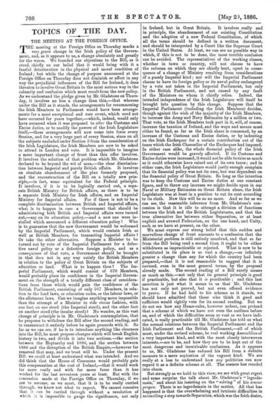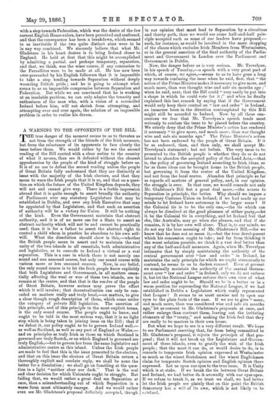TOPICS OF THE DAY.
THE MEETING AT THE FOREIGN OFFICE.
TEE meeting at the Foreign Office on Thursday marks a very grave change in the Irish policy of the Govern- ment, and, as it appears to us, a change absolutely and greatly for the worse. We founded our objections to the Bill, as it stood, chiefly on our belief that it would bring with it a fearful deterioration in the physical and moral condition of Ireland ; but while the change of purpose announced at the Foreign Office on Thursday does not diminish or affect in any way the prejudicial influences of the Bill for Ireland, it does threaten to involve Great Britain in the most serious way in the calamity and confusion which must result from the new policy. As we understand the pledge given by Mr. Gladstone on Thurs- day, it involves no less a change than this,—that whereas under the Bill as it stands, the arrangements for resummoning the Irish Members to Parliament would have been arrange- ments for a most exceptional and rare event, which need not have occurred for years together,—which, indeed, would only have occurred when it was proposed to alter the Customs and Excise duties, or to modify the powers of the Irish Legislature itself,—these arrangements will now come into force every Session, and for a very large part of every Session, since on all the subjects excluded under Section 3 from the consideration of the Irish Legislature, the Irish Members are now to be asked to attend in London and vote. It is impossible to imagine a more important change of front than this offer involves. It involves the solution of that problem which Mr. Gladstone declared to be beyond the wit of man,—the clear discrimina- tion between Imperial and purely British affairs. It involves an absolute abandonment of the plan formerly proposed, and the reconstruction of the Bill on a totally new prin- ciple,—in fact, some equivalent for the Federal principle. It involves, if it 18 to be logically carried out, a sepa- rate British Ministry for British affairs, as there is to be a separate Irish Ministry for Irish affairs, and an Imperial Ministry for Imperial affairs. For if there is not to be a complete discrimination between British and Imperial affairs, what is to happen in case a Government that should be administering both British and Imperial affairs were turned out,—say on its education policy,—and a new one were in- stalled which announced a different education policy ? Who is to guarantee that the new Government would be welcomed by the Imperial Parliament, which would contain Irish as well as British Members, for transacting Imperial affairs ? Or take the other alternative. Suppose a Minister to be turned out by vote of the Imperial Parliament for a defec- tive naval policy or a defective foreign policy, and as a consequence of that vote, a Government should be brought in that does not in any way satisfy the British Members in relation to the policy of Great Britain on the subjects of education or land. What is to happen then ? The Im- perial Parliament, which would consist of 670 Members, would probably place its confidence in the Imperial Govern- ment on the strength of a totally different class of considera- tions from those which would gain the confidence of the British Parliament, consisting of only 567 Members, in rela- tion to the land laws, or education codes, or the labour laws, or the allotment laws. Can we imagine anything more impossible than the attempt of a Minister to ride circus fashion, with one foot on one steed (the Imperial steed), and the other foot on another steed (the insular steed)? No wonder, as this vast change of principle is in Mr. Gladstone's contemplation, that he proposes to withdraw the Bill after the second reading, and to reconstruct it entirely before he again proceeds with it. So far as we can see, if he is to introduce anything like clearness into the Bill, he must propose changes which will break English history in two, and divide it into two sections,—the section between the Heptarchy and 1886, and the section between 1886 and the disruption of the British Empire,—however far removed that may, and we trust will be. Under the present Bill, we could at least understand what was intended. And we did think that the House of Commons would probably gain this compensation at the cost of Ireland,—that it would work far more easily and with far more force than it has worked for the last seventeen years at least. But with the concession made at the Foreign Office on Thursday, if we are to assume, as we must, that it is to be really carried through, we know not what to expect. We cannot conceive that it can be carried through without a revolution of which it is impossible to gauge the significance, not only
in Ireland, but in Great Britain. It involves really and
in principle, the abandonment of our existing Constitution and the adoption of a new Federal Constitution, of which all the terms should be defined in a written document, and should be interpreted by a Court like the Supreme Court in the United States. At least, we can see no possible way in which, if this is not to be done, the most terrible confusion can be avoided. The representatives of the working classes, whether in town or country, will not choose to have the reforms on which they are chiefly bent, upset in conse- quence of a change of Ministry resulting from considerations of a purely Imperial kind ; nor will the Imperial Parliament choose to have its foreign policy or its naval policy endangered by a vote not taken in the Imperial Pailiament, but only in the British Parliament, and not caused by any fault of the Ministers on whom it chiefly relies. Indeed, the intended independence of the Irish Legislature will itself be brought into question by this change. Suppose that the Imperial Parliament (including the Irish Members) decides, though against the wish of the majority of the Irish Members, to increase the Army and Navy Estimates by a million or two. That vote, as the Irish Members took part in it, will, of course, increase the taxation of Ireland, and the ways and means must either be found, so far as the Irish share is concerned, by an increase of the Customs and Excise duties, or by indenting on the Irish Exchequer for a certain contribution out of the taxes which the Irish Chancellor of the Exchequer had imposed. In either case alike, the whole financial policy of the Irish Government would be gravely affected. If its Customs and Excise duties were increased, it would not be able to raise as much as it could otherwise have raised out of its own taxes ; and in either case, the Irish Legislature would justly enough complain that its financial policy was not its own, but was dependent on the financial policy of Great Britain. So long as the intention was to keep the Customs and Excise duties at one constant figure, and to throw any increase we might decide upon in our Naval or Military Estimates on Great Britain alone, the Irish Legislature was at least in a position to cut its coat according to its cloth. Now this will be so no more. And so far as we can see, the reasonable inference from Mr. Gladstone's con- cession is that it is idle to attempt a division of functions between the Irish and the British Legislatures, and that the true alternative lies between either Separation, or at least explicit and avowed Federation, on the one hand, and Unity, such as we have at present, on the other.
We must express our strong belief that this sudden and marvellous change of front amounts to a confession that the Ministerial problem is still entirely unsolved, and that so far from the Bill being read a second time, it ought to be either withdrawn as impracticable or rejected. What is now to be substituted in its place is so vast a change,—so infinitely greater a change than any for which the country had been prepared,—that it is not reasonable to suggest that it is covered, even in the most general terms, by the proposal already made. The second reading of a Bill surely means as much as this,—not only that its general principle is good if practicable, but also that it is practicable ; and this last assertion is just what it seems to us that Mr. Gladstone has not only not proved, but not even offered evidence to prove. If he had held to his scheme as it stands, we should have admitted that those who think it good and sufficient would rightly vote for its second reading. But we do not see how any Home-ruler, however ardent, can pretend that a scheme of which we have not even the outlines before us, and of which the difficulties seem so vast as we have indi- cated, is really practicable till Mr. Gladstone has told us what the normal relations between the Imperial Parliament and the Irish Parliament and the British Parliament,—all of which must, under the revised scheme, be real working Assemblies of a very important kind, and with the most, closely interwoven interests,—are to be, and how they are to be kept out of the most dangerous and inextricable confusions. As it appears to us, Mr. Gladstone has reduced his Bill from a definite measure to a mere aspiration of the vaguest kind. We are really at a loss to understand how any politician can now regard it as a definite scheme at all. The cosmos has receded into chaos.
But strongly as we hold to this view, we see with great regret and some surprise the talk about Mr. Gladstone's "legerde- main," and about his insisting on the " salving " of his amour propre. There is no legerdemain in the matter. All that has happened is that the overwhelming and intrinsic difficulties in reconciling a step towards Separation, which was the Irish desire,
with a step towards Federation, which was the desire of the few earnest English Home-rulers, have been perceived and confessed. and that the consequence has been a breakdown, which seemed to us inevitable if the two quite distinct aims were to be in any way combined. We sincerely believe that what Mr. Gladstone in his heart desires is to bring Ireland closer to England. He held at first that this might be accomplished by admitting a partial, and perhaps temporary, separation, and that, we think, was the wiser course, if any concession to the Parnellites were to be made at all. He has now been over-persuaded by his English followers that it is impossible to take a step tending towards Separation without deeply wounding British pride ; and he is going to attempt what seems to us an impossible compromise between Separation and Federation. But while we are convinced that he is working at an insoluble problem, we can only admire the tenacity and enthusiasm of the man who, with a vision of a reconciled Ireland before him, will not shrink from attempting, and attempting over and over again, the solution of an impossible problem in order to realise his dream.



































 Previous page
Previous page